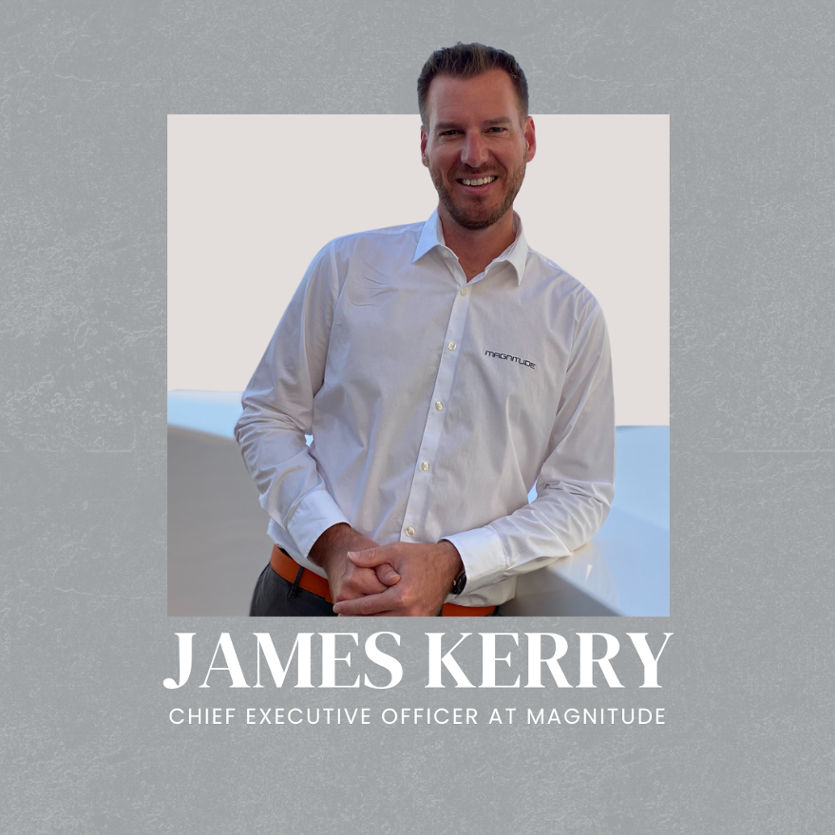CATEGORIES
Entrepreneurial Mindset | People We Admire | Work CultureOverview:
- James Kerry started his maritime career in Fleetwood, England as a cadet.
- A chance meeting led him from offshore work to the superyacht industry and then to Magnitude .
- James believes in respect, trust, and creating a supportive work environment. He also prioritizes women in leadership roles in his company.
- He focuses on leading yacht design with an emphasis on sustainability and proactive measures.
- In his free time, James enjoys running and walking his dog, Shinko.
1. Tell us about yourself, your childhood, and the influences that led you to where you are today.
I grew up in New Zealand and spent my early years at boarding school until I was 15. At that point, I made a significant change: I decided to go to sea. I started my maritime career as a cadet and worked from the ground up. Over the years, I advanced through the ranks to become a master mariner unlimited and captain in the oil and gas industry, where I spent around 12 years before transitioning to the superyacht industry. In the superyacht world, I immediately took on the role of captain, commanding yachts ranging from 125 to 146 meters. I had the privilege of working with some fantastic people and overseeing numerous new build projects in both the commercial and yachting sectors.
Three years ago, I was offered an exciting opportunity to start something new at Magnitude. With a fantastic team already in place, we’ve spent the past three years focusing on building for our clients and ensuring our team’s satisfaction. Looking back, I realize how much my career at sea has shaped me. I initially chose the maritime path without fully understanding it simply because it seemed like a better option than staying in boarding school. Now, I wouldn’t trade those experiences for anything.
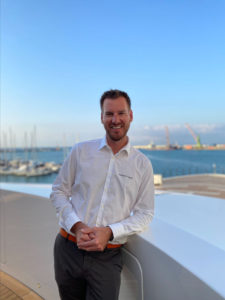
2. What sparked your initial interest in the maritime industry, and how did your early experiences shape your career in yacht building?
I never set out to build a company or dive into yachting. My journey into the yacht industry began quite unexpectedly. My background was in the offshore industry, where I was a captain on new build programs for semi-submersible accommodation units. I worked on projects in Singapore and China, but when the oil and gas industry hit a downturn, I could see the writing on the wall. I started exploring other opportunities. I had friends in yachting who spoke highly of the field, so I was curious about it. One day, while out and about in Singapore, I struck up a conversation with a gentleman sitting next to me. We talked about various topics, and when he asked about my work, I mentioned my role as a captain on a new build program. He happened to be connected to someone looking to build a new yacht, and what started as a casual conversation led to an unexpected opportunity. The next morning, despite my plans to fly back to Europe, he insisted we meet his boss who was in another country. I thought it was a joke, but he was serious. We ended up discussing yacht projects, and by the end of the meeting, I was offered a position. It was a spontaneous decision, but it led me to a new path. I worked with them for seven years in various roles in yachting.
3. Tell us about your journey from being a captain to becoming the chief executive officer of Magnitude.
It’s interesting how life can pivot so quickly based on personal circumstances and relationships. After retiring, I was fully content with the simple pleasures of life, like walking my dog in the countryside. It was peaceful, cost nothing, and allowed me to reconnect with nature. However, my daughter influenced my decision to return to work. She expressed how proud she was to tell her friends that I was a yacht captain, which made me reconsider my retirement. At the same time, my dog seemed to be giving me the hint that perhaps more variety in my daily routine might be beneficial for both of us. The transition back into the maritime industry was almost serendipitous. I reached out to a contact, and within a few days, I found myself moving to Italy to work on a new project. This project ultimately set the stage for the creation of Magnitude.
4. How would you describe your leadership style and what do you think makes it work?
My leadership style is all about assessing each individual based on their unique qualities. I believe that everyone brings something different to the table and that diversity is what makes working together interesting and effective. While our approaches and terminologies might differ—what I call A, you might call B, or even something entirely different—we’re all aiming for the same core goal.
My core values are respect, trust, and loyalty. I start by showing respect to everyone I meet. I engage actively, remember names, and ensure that everyone knows they have my support. When I was a captain, my standing orders were simple: reach out to me anytime for any reason, and you’ll always have my backing. The only time you might face issues is if you hesitate to contact me when you need help. My role is to support you, and if you’re well-supported, you’ll perform better. And if you’re performing well, you’re likely enjoying your work. Creating a positive environment where people feel comfortable and secure is essential. In a supportive and happy atmosphere, work doesn’t feel like work. Even when pressure arises, knowing you have a reliable team and the freedom to ask for help can make all the difference.
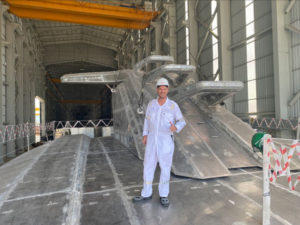
5. Considering the notable leadership roles (chief of staff, chief scientist, etc) you’ve had in your career, what advice would you give to young individuals with big dreams in their 10/20-year plan? How can they ensure that they get there?
I believe it’s crucial to have a dream and a clear vision. Ideas are constantly emerging, but people often expect immediate success. Patience is essential. It’s important to understand that there’s more than one way to reach your goals. If you rush to the top of the mountain without proper preparation, you might find yourself lacking the right gear—whether it’s shoes, a jacket, or rope. Being prepared and planning your journey is key. When embarking on something new, there isn’t always a pre-existing path. You’ll encounter challenges and obstacles that require problem-solving. Sometimes, this means going back to retrieve necessary supplies or even changing your approach entirely. The important thing is to keep your focus on the goal, no matter the detours.
Today’s youth have an abundance of information at their fingertips, unlike my generation, who had limited TV channels and access to information through friends, family, and books. With instant access to media, it’s easy to expect quick results. However, it’s important to remember that good things take time. Taking a moment to breathe, reflect, and approach your goals gradually is vital. As long as you have a clear idea and remain committed, progress will come.
6. As a leader, vulnerability can sometimes be seen as a weakness. How do you balance vulnerability and authenticity in your interactions, both at work and in your personal relationships?
To navigate the complexities of leading and working with people, it’s essential to embrace the fact that no one is infallible. Mistakes are part of the process, and acknowledging them openly helps in fostering a collaborative and trusting environment. When I was a captain on a ship, for example, a simple error in direction could have serious implications. Recognizing and owning up to such mistakes is crucial, and it highlights the importance of clear communication. I believe in working with people rather than simply managing them. This means seeing each individual as a partner rather than someone subordinate to me. I emphasize that everyone is in their role because of their expertise and professionalism. I strive to provide consistent feedback and maintain clear boundaries.
While it’s impossible to please everyone or agree on everything, establishing clear lines helps prevent misunderstandings. People know where the boundaries are and understand the consequences if they cross them. This approach minimizes conflicts because it sets clear expectations and ensures that everyone is aware of their limits. In managing people, I use a metaphorical box system to define their boundaries. Inside the box, they have the freedom to operate and make decisions. There’s also a shaded area for situations that require additional permissions. Outside of these defined zones, there are strict rules and consequences. This framework allows for both autonomy and structure.
Additionally, recognizing that procedures and policies are living documents is important. As our company grows and the industry evolves, procedures must adapt. While our current systems might not cover every new development, we remain open to feedback and flexible in updating our protocols. This adaptability is crucial for staying relevant and effective.
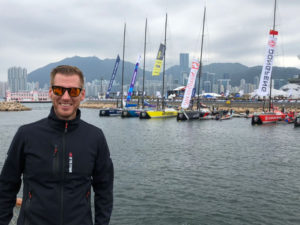
7. Why does Magnitude prioritize having women in leadership roles, and how did you curate a work culture that supports this?
Most people who know me well are aware that my grandmother played a huge role in shaping who I am today. She raised me while I was at boarding school, and everything good in my life can be attributed to her. My grandfather also had an influence from a male perspective, but it was my grandmother who instilled in me the values of respect and kindness towards everyone, regardless of who they are or what they do. To me, we’re all equal, and basic manners like saying “please,” “thank you,” and “hello” cost nothing but mean everything.
I’ve always believed that women are incredibly strong, and this belief is reinforced by the amazing women I work with. In my company, every senior position except for mine as CEO and Richard’s as Managing Director is held by a woman. They are absolutely exceptional. For example, my Chief Financial Officer is a former mathematics professor with an extraordinary grasp of numbers. She’s incredibly organized, communicates effectively, and isn’t afraid to call me out when I’m off track. Similarly, my Head of HR is not only mentally strong but also has a great sense of humor and deep understanding. Both of them know that I’m not particularly interested in finance or HR, so they ensure I focus on what I need to. Richard, my mentor and Managing Director, and I have similar thought processes as men. We often come up with ideas that seem brilliant to us, only to have the women in our management meetings point out the flaws or improvements needed. Their detailed, communicative approach is something I admire and envy. They see the finer details that we might miss.
8. What were some of the biggest challenges you faced in your career, and how did you overcome them?
Reflecting on my career, I never initially set out to do what I’m doing now. Three years ago, if you’d asked me about my day-to-day life, I would have been talking about my role as a captain on board a ship, which I did for over a decade. What I’m doing today emerged quite unexpectedly. To give you some context, I was content managing a yacht build project with a dedicated team of five. The situation changed when global conflicts affected our industry. The company I was working for on behalf of the yacht owner decided to leave the industry, leaving me in a challenging position. Initially, I was concerned about the future of the project. When I reached out to the owner, I was surprised to learn that I and my team would be taking over as the new management. This unexpected turn meant I had to quickly establish a new company, set up financial systems, and ensure we could meet our obligations. It was a crash course in business management. The initial setup was daunting. We had to come up with a company name, secure a website, and handle all the administrative details I hadn’t previously considered.
Despite the pressure to pay my team and keep the project on track, we managed to establish the company and start operating. Soon, the company rapidly expanded beyond what I had anticipated. What began as a single project quickly grew into multiple opportunities. The expansion required us to build systems for HR, finance, and other essential functions—things I hadn’t been trained for as a sailor. I recognized that to overcome these challenges, I needed experts in various fields. By bringing in skilled professionals for finance, HR, and other areas, we were able to build and move the business forward effectively.
9. If you could go back and do one thing differently in your career, what would it be?
My career has taught me that looking back and wishing to change things isn’t productive. Every experience, whether successful or not, carries a lesson. I believe that if I were to change something, I’d risk losing those valuable lessons. A friend once said he’d like to go back in time with the knowledge he has now, which sounded tempting. However, for me, that idea is daunting. I value the relationships and experiences I’ve built over the years, and starting over would mean reliving those early stages, which could be frustrating. Instead, I focus on reflecting on the past to appreciate the journey, but I wouldn’t change it. We got some things right the first time and learned from those that didn’t. I resonate with Thomas Edison’s perspective on failure: he saw his many attempts not as failures but as discoveries of what didn’t work. In the same way, I see my own experiences as steps that have shaped who I am today. So, while it’s important to remember and learn from the past, I wouldn’t alter it. I’m grateful for the path I’ve traveled, as it’s made me who I am.
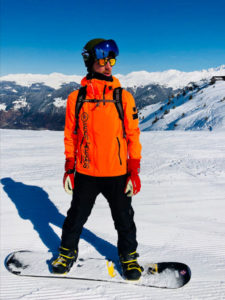
10. How do you foresee Magnitude shaping the future of yacht design and sustainability?
The maritime environment is vast and vital to life on Earth. As someone deeply involved in the yacht industry, my commitment is to ensure that we uphold the highest environmental standards. The sea, being the largest and most encompassing environment on the planet, has a profound impact on our global ecosystem. It’s crucial that we protect it. In the yacht industry, our role isn’t to design yachts but to collaborate with industry specialists who do. Our focus is on ensuring that the yachts we work with meet the highest standards of environmental stewardship.
We must be proactive rather than reactive when it comes to environmental issues. The maritime industry has seen its share of environmental disasters, such as the Exxon Valdez oil spill and the Deepwater Horizon spill. These events underscore the consequences of inadequate safety and environmental practices. My goal is to ensure that our industry moves beyond these reactive approaches and embraces a proactive stance. I want to contribute to an industry where we do things right from the beginning, ensuring that yacht owners get exactly what they want while maintaining a commitment to environmental safety. My aim is to leave no trace of negative impact and to ensure that future generations do not look back and point to our actions as the cause of environmental harm.
11. How were you able to set and achieve your set goals, personally and business wise?
I believe one of the great things about life is how goals can evolve and shift. I’ve never been one to set rigid goals at the start of the year. For example, my latest goal emerged unexpectedly: running an ultra-marathon over an English mountain range with my best friend. I only found out about it when he signed me up and casually mentioned, “Oh, by the way, in four months, we’re running a 120-kilometer race.” This spontaneity illustrates how sometimes goals can be set for us, presenting new challenges we didn’t foresee.
My personal goal, however, is more about the people I work with. I genuinely love the team I’m surrounded by—they’re truly amazing. My aim is to ensure they’re content, have fulfilling challenges, and feel valued every day. I believe that since we don’t get the present back, it’s crucial to make the most of it and foster happiness. I focus on bringing joy and confidence to those around me daily. If something is wrong, I try to help where I can. Communication is key to solving problems, and if a solution isn’t readily available, creating one becomes an exciting challenge. I approach work with enthusiasm, ready to tackle obstacles and find innovative solutions. My motivation comes from continuously challenging ourselves and supporting each other, making every day a meaningful and engaging experience.
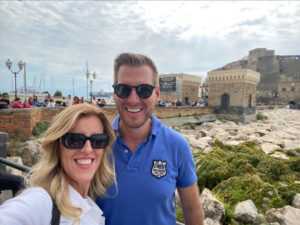
12. What does a day in your life look like?
A day in my life can vary greatly depending on the day. With offices around the world—in Dubai, Italy, Germany, Turkey, and China—travel is a significant part of my routine. I often start my day on an airplane, waking up trying to figure out which country I’m in and where I’m headed next. But beyond travel, my role is to be present and supportive, whether that’s through WhatsApp, phone calls, virtual meetings, or in person. My focus is on ensuring that our team at Magnitude has everything they need to succeed, from tools and resources to handling new challenges as they arise.
Another key part of my job is client management. I strive to keep our clients informed and anticipate their needs so they don’t have to ask for anything. Our company mantra is that if a client needs to request something, we’ve already missed the mark. We aim to provide options and solutions proactively, ensuring that clients are always well-informed. My day is filled with a diverse range of meetings—from finance and construction to operations, human resources, and business development. The variety keeps my work engaging and ensures that no two days are ever the same.
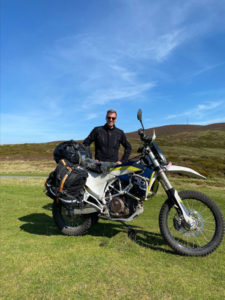
13. Have you had any mentors throughout your career, and how have they influenced your life?
In the maritime world, you don’t just wake up and decide to be a captain or a chief officer. The profession demands extensive training, experience, and dedication. Everyone in a senior position has had a role in shaping my journey, whether as mentors or through their actions and behaviors. I’ve been fortunate to have had some exceptional mentors who have guided me with wisdom and support. At the same time, I’ve learned valuable lessons from those who weren’t as supportive or who exhibited qualities I didn’t want to emulate. Every experience, whether positive or negative, has contributed to shaping my approach and mindset.
One of the most significant influences in my career has been Richard Eastham, a mentor who has been instrumental in my development. Despite his retirement seven years ago, Richard has continued to offer guidance and support as I established Magnitude. His advice, such as whether to set up the company to be redundant from day one or from year ten, has been invaluable. Richard’s impact goes beyond practical advice; it’s about the kind of person he is. His humility, dedication, and expertise are qualities I aspire to embody. He now serves as the managing director of Magnitude, and I continually learn from his example. If I can be even a fraction of the person he is, I’ll consider my career a success.
Overall, having great mentors and surrounding oneself with supportive, experienced individuals is crucial in any profession. I’m grateful for the guidance I’ve received and strive to pass on that support to others who are eager to learn and grow.
14. What helps you unwind after a long day? What are your interests outside of work?
I’m a big believer in the idea that a healthy body leads to a healthy mind and vice versa. I’ve always been passionate about sports, but I had to give up team sports a while ago because I couldn’t commit the time needed. These days, I find running to be a great alternative. For me, running isn’t just about the physical benefits; it’s more about clearing my mind. I use those 45 minutes daily to unplug, as my best ideas usually come when I’m not actively thinking too hard.
Another favorite activity of mine is walking my dog. When I’m at home, spending time with my dog and going for walks is one of my greatest joys. It’s a simple pleasure that helps me unwind and connect with the world around me. As for my dog’s name, there’s a fun story behind it. My dog is named Shinko, which my sister thought sounded quite cultured. She mentioned that in Japanese, “Shinko” can mean “best friend” or “friend,” and she was impressed by what she thought was my sophisticated choice. However, the real story is much simpler. Years ago, when Bluetooth speakers first became popular, I bought a little black speaker from a brand called Shinko. I kept misplacing it and would call out for it, saying, “Shinko, where are you?” When I finally got my black lab, I decided to name him after that old speaker.
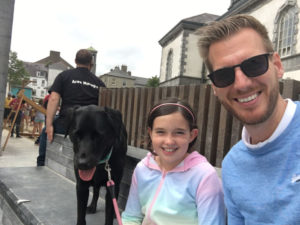
15. What motto or life philosophy do you live by?
I believe that the key to a fulfilling life is being happy every day because we don’t get any day back. No matter who you meet, always remember that manners cost nothing. Being courteous and listening to others is essential, whether in professional or personal settings. Everyone has their own struggles and challenges, and you never know what someone might be going through. If someone seems out of character or isn’t as friendly as you’d expect, try to understand their situation. They might be dealing with something you can’t see.
In 20 years, you’ll look back and likely wish you could relive the present moment, so make the most of it now. Enjoy life and seek out experiences rather than focusing solely on material wealth. When you’re older, having a pile of money won’t matter as much as the memories you’ve made and the experiences you’ve had. Instead of sitting in front of a screen, challenge yourself to explore, learn, and grow. The world is vast, but beauty can be found in small, everyday moments. If I were to explain humanity to an alien, I’d take them to an airport departure lounge. There, you’d witness the full spectrum of human emotions—the best and the worst. From the frustration of delays and cancellations to the joy of reunions with loved ones, the airport captures the essence of the human experience. It’s a place where you can see the profound love, respect, and happiness people share. So, my advice is to stay happy, be kind, and embrace every moment—you never know what wonderful experiences life might bring.
Conclusion:
Raised in New Zealand, James began his maritime career as a cadet and now serves as the CEO of Magnitude, a Yacht company. He is a leader who strives for authenticity and open communication, creating a positive and inclusive environment.

